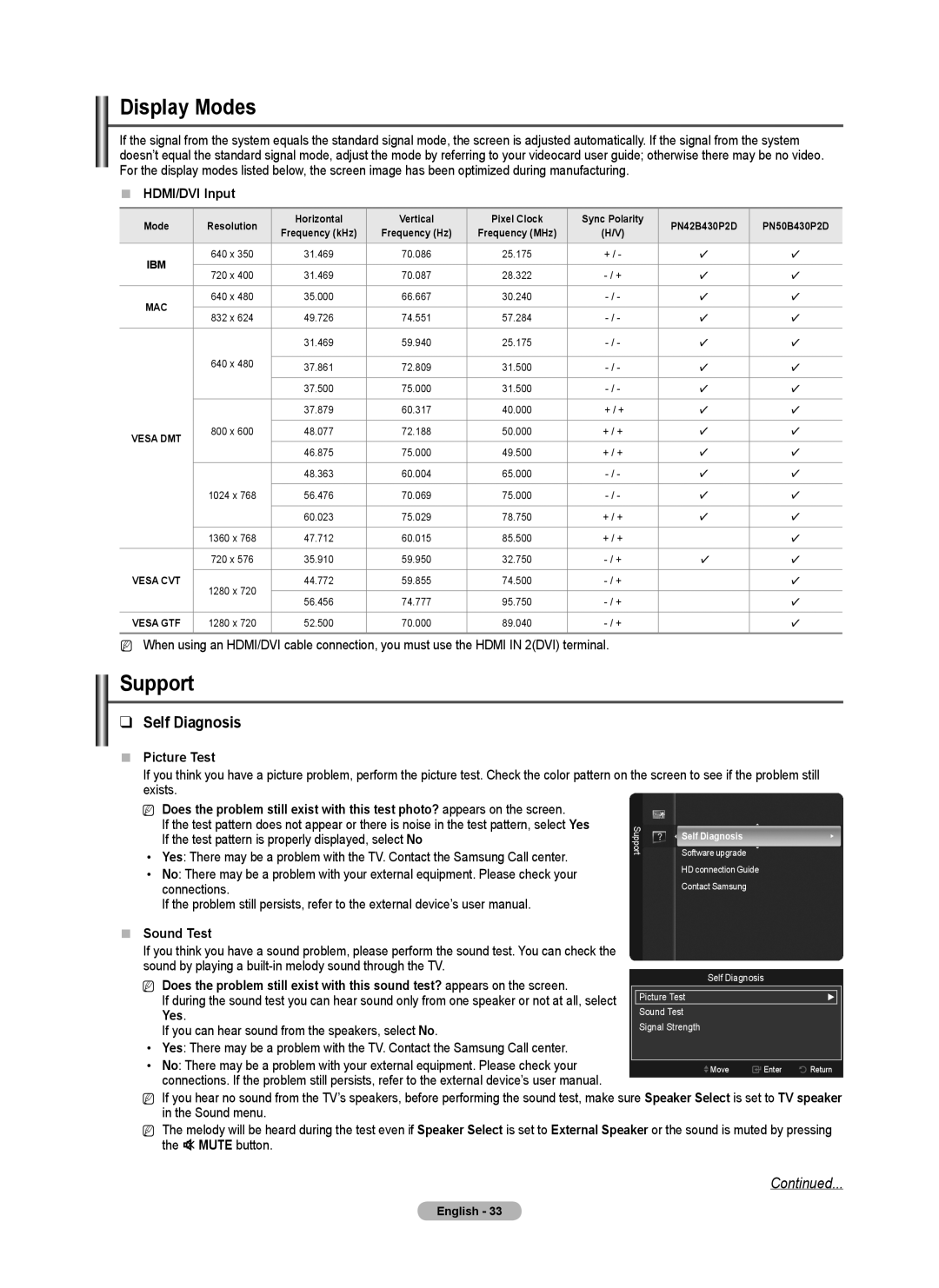
Display Modes
If the signal from the system equals the standard signal mode, the screen is adjusted automatically. If the signal from the system doesn’t equal the standard signal mode, adjust the mode by referring to your videocard user guide; otherwise there may be no video. For the display modes listed below, the screen image has been optimized during manufacturing.
HDMI/DVI Input
Mode | Resolution | Horizontal | Vertical | Pixel Clock | Sync Polarity | PN42B430P2D | PN50B430P2D | |
Frequency (kHz) | Frequency (Hz) | Frequency (MHz) | (H/V) | |||||
|
|
|
| |||||
|
|
|
|
|
|
|
| |
IBM | 640 x 350 | 31.469 | 70.086 | 25.175 | + / - | ✓ | ✓ | |
|
|
|
|
|
|
| ||
720 x 400 | 31.469 | 70.087 | 28.322 | ✓ | ✓ | |||
| ||||||||
|
|
|
|
|
|
|
| |
MAC | 640 x 480 | 35.000 | 66.667 | 30.240 | ✓ | ✓ | ||
|
|
|
|
|
|
| ||
832 x 624 | 49.726 | 74.551 | 57.284 | ✓ | ✓ | |||
| ||||||||
|
|
|
|
|
|
|
| |
|
| 31.469 | 59.940 | 25.175 | ✓ | ✓ | ||
| 640 x 480 |
|
|
|
|
|
| |
| 37.861 | 72.809 | 31.500 | ✓ | ✓ | |||
|
|
|
|
|
|
|
| |
|
| 37.500 | 75.000 | 31.500 | ✓ | ✓ | ||
|
|
|
|
|
|
|
| |
|
| 37.879 | 60.317 | 40.000 | + / + | ✓ | ✓ | |
|
|
|
|
|
|
|
| |
VESA DMT | 800 x 600 | 48.077 | 72.188 | 50.000 | + / + | ✓ | ✓ | |
|
|
|
|
|
|
| ||
| 46.875 | 75.000 | 49.500 | + / + | ✓ | ✓ | ||
|
| |||||||
|
|
|
|
|
|
|
| |
|
| 48.363 | 60.004 | 65.000 | ✓ | ✓ | ||
|
|
|
|
|
|
|
| |
| 1024 x 768 | 56.476 | 70.069 | 75.000 | ✓ | ✓ | ||
|
|
|
|
|
|
|
| |
|
| 60.023 | 75.029 | 78.750 | + / + | ✓ | ✓ | |
|
|
|
|
|
|
|
| |
| 1360 x 768 | 47.712 | 60.015 | 85.500 | + / + |
| ✓ | |
|
|
|
|
|
|
|
| |
| 720 x 576 | 35.910 | 59.950 | 32.750 | ✓ | ✓ | ||
|
|
|
|
|
|
|
| |
VESA CVT | 1280 x 720 | 44.772 | 59.855 | 74.500 |
| ✓ | ||
|
|
|
|
|
|
| ||
| 56.456 | 74.777 | 95.750 |
| ✓ | |||
|
|
| ||||||
|
|
|
|
|
|
|
| |
VESA GTF | 1280 x 720 | 52.500 | 70.000 | 89.040 |
| ✓ |
N When using an HDMI/DVI cable connection, you must use the HDMI IN 2(DVI) terminal.
Support
❑Self Diagnosis
Picture Test
If you think you have a picture problem, perform the picture test. Check the color pattern on the screen to see if the problem still exists.
NDoes the problem still exist with this test photo? appears on the screen.
If the test pattern does not appear or there is noise in the test pattern, select Yes If the test pattern is properly displayed, select No
•Yes: There may be a problem with the TV. Contact the Samsung Call center.
•No: There may be a problem with your external equipment. Please check your connections.
If the problem still persists, refer to the external device’s user manual.
Sound Test
If you think you have a sound problem, please perform the sound test. You can check the sound by playing a
N Does the problem still exist with this sound test? appears on the screen.
If during the sound test you can hear sound only from one speaker or not at all, select Yes.
If you can hear sound from the speakers, select No.
•Yes: There may be a problem with the TV. Contact the Samsung Call center.
•No: There may be a problem with your external equipment. Please check your connections. If the problem still persists, refer to the external device’s user manual.
Support | Self Diagnosis | ▶ |
| ||
|
| |
| Software upgrade |
|
| HD connection Guide |
|
| Contact Samsung |
|
Self Diagnosis
|
|
|
|
| Picture Test |
| ► |
| Sound Test |
|
|
| Signal Strength |
|
|
|
|
|
|
| Move | Enter | Return |
NIf you hear no sound from the TV’s speakers, before performing the sound test, make sure Speaker Select is set to TV speaker in the Sound menu.
NThe melody will be heard during the test even if Speaker Select is set to External Speaker or the sound is muted by pressing the ![]() MUTE button.
MUTE button.
Continued...
English - 33
